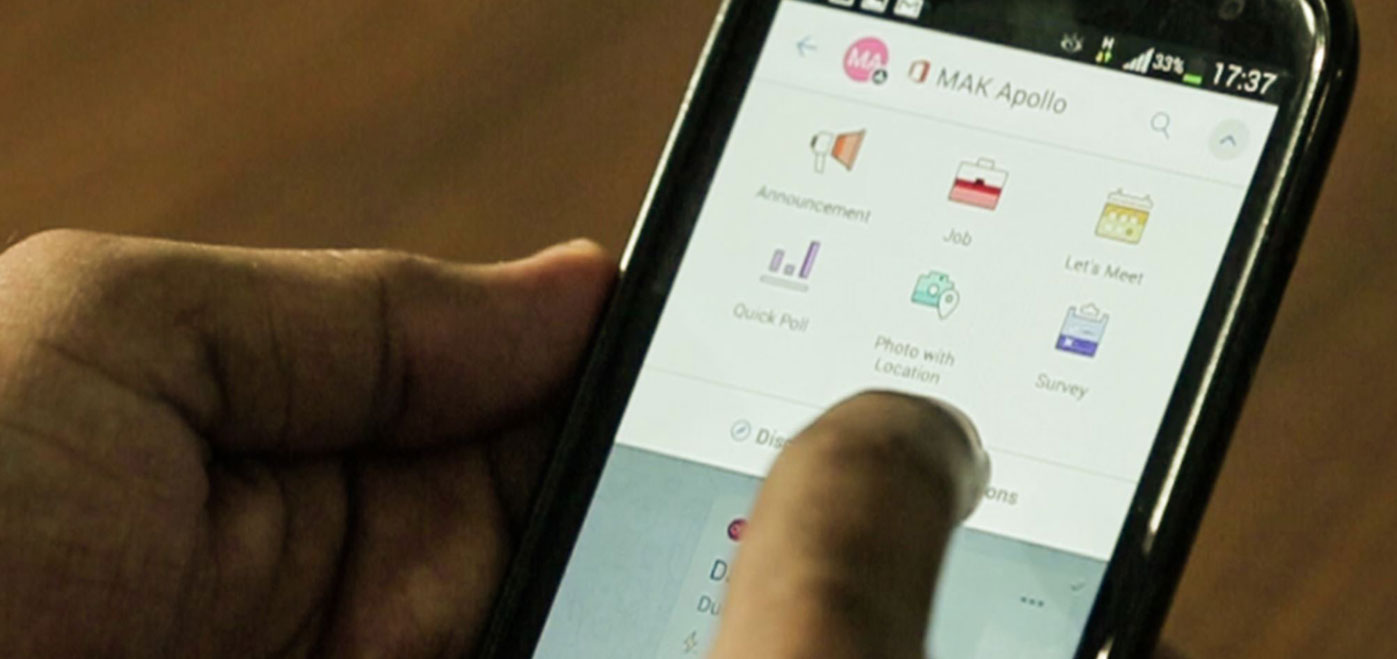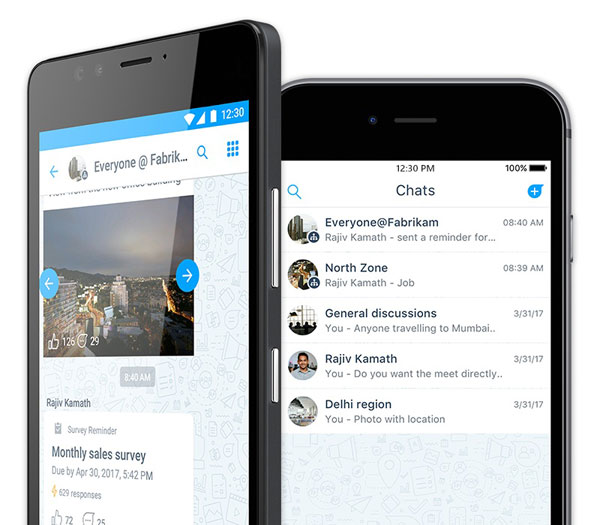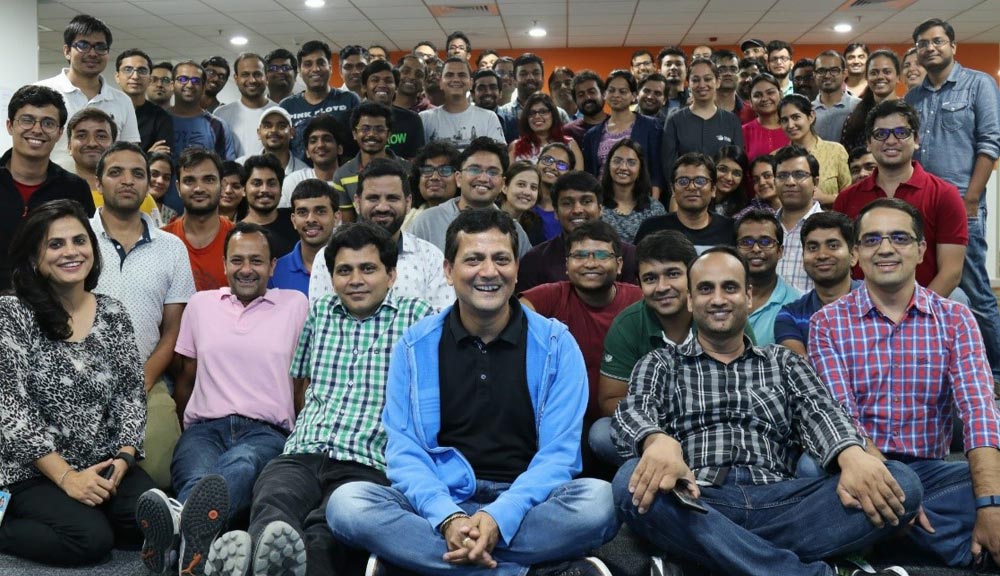Microsoft Kaizala
A mobile app for large group communications and work management

"Execs are looking to Kaizala to give visibility and control of the operations in clinics across the state."
About Microsoft Kaizala
Microsoft Kaizala is a mobile messaging (chat) app for large group communications and work management for modern workplace which enables organizations to communicate efficiently and securely with their Firstline Workforce, the value-chain outside the organization, and even their customers. It facilitates secure large group communication & discussion, message broadcast, work management, and complaint redressal, leading to better information flow and higher productivity.
Communicate with large open directory
- Millions of users on chat, unlike any other platform
- Connect with people within and outside of organization (business partners, customers)
- New ways to connect – hierarchical groups, publicly discoverable business groups (Hub-Spoke)
Work Management
- Manage work on chat using Action Cards
- Build your own Action cards (apps) distributed on chat
- Enable workflows and integrate with business applications like CRM, HRM, ERP, etc.
Security and Chat Data Ownership
- Like email in Office 365, own your organizations chat data
- Put control on who has access to data
- Data leak protection using chat policies & control
Kaizala is now part of Office 365. Kaizala is commercially available in select markets, however, the mobile application is available in both Apple and Google stores for usage across all countries. Learn about features from the Kaizala playlist on YouTube.

Video
Journey
Corporate Vice President Rajiv Kumar was inspired by Satya Nadella to ‘hit refresh’, to re-evaluate what productivity meant to mobile phone users who are on-the-go and rely on their phones to do much of their work. He went on a year-long journey talking with customers from all over the world about what they expected from a mobile-phone experience to be productive.
These learnings included insights such as people plugging-in consumer technologies into organizational workflows, and chat applications playing a much larger role in day-to-day work. Along with these learnings, the Office team in India found out through numerous focus groups and personal interviews that many businesses and individuals were not only mobile-first, but mobile-only, and needed better mobile apps for their phones to do three key things – create content on the fly, manage contacts in a phone-based customer relationship management system, and have a shared, secure mobile environment for teams to collaborate.
The Kaizala team focused on fulfilling these needs while providing structure to unstructured communication along with private channels and more secure ways to discuss and protect sensitive organizational data. These opportunities and more would be realized and implemented in what is now known as Microsoft Kaizala, an app for group communications and work management on IOS and Android.
“Effective collaboration is key to running a successful business. We observed that conversations form the backbone of a business setting and often lead to actionable tasks,” Prashant Gupta, a program manager within Office on the early stages of the app. “Currently in the unorganized small businesses space, there are hardly any tools that allow users to add structure and improve the overall efficiency of their business.”
The original Kaizala project team started with the vision to “Empower every organization and community to achieve more through secure and purposeful chat.” The Microsoft Garage was the perfect platform to help the early versions of Kaizala reach their initial set of customers, to experiment, get feedback, and quickly iterate.
Kaizala was launched as a Garage project on 22 Feb 2016. By April, it was being used by Andhra Pradesh government officials for group communication during large scale events.
Kaizala was used to effectively manage and coordinate a festival attended by 20 million people. Many government and state departments in India took notice and began using Kaizala, as did other well-known organizations in the country.
On 22 Feb 2017, exactly one year after releasing through the Garage, Satya Nadella announced the product in preview in Future Decoded event in India.
The project has embraced hack culture throughout its entire journey. At the 2016 Hackathon, the team took the opportunity to double down on a variety of ideas. Three features developed at 2016 Hackathon shipped in Kaizala: Kaizala Arena, Comments and Likes, and Awesome Photo Sharing. The team has carried on this tradition of using hackathons to rapidly prototype features and ideas, and in 2017, Kaizala sparked what could be characterized as a local movement – 26 projects for Kaizala were hacked on with over 50 people participating.
Kaizala provides an easier and more productive way for these organizations to collaborate with their employees, supporters, customers, and partners. Kaizala is also easily extensible and continues to be integrated into many organizations’ existing workflows, bringing effective, structured communication and work management to a mobile world.
Team

Microsoft Kaizala
Rajiv Kumar, Corporate Vice President, Microsoft India with the Kaizala team
Kaizala, a Microsoft Garage project
Shashank Agarwal, Sameer Agrawal, Ravish Arora, Shashi Kant Awasthi, Rohit Bhatia, Abhisek Behera, Amit Dangwal , Salil Das, Sabarigirinathan G, Ajay Gupta, Prashant Gupta, Pankaj Jain, Ankit Kapoor, Jayram Kumar, Steve Menezes, Deepak Menon, Shantanu Prasad, Arun Rajappa, Kulothungan Rajasekaran, Animesh Seth, Arushi Singh, Dharmanand Singh, Lokesh Tiwary, Akshay Vasudev
Press
Microsoft enables digital payments services on Microsoft Kaizala
Computer World
Kaizala has seen strong uptake in BFSI, public cos: Microsoft
Economic Times, India
Microsoft Launches Kaizala Mobile App in Kenya
IT News Africa
Microsoft’s New Kaizala App Is What WhatsApp for Business Should Have Been
Gadgets 360


